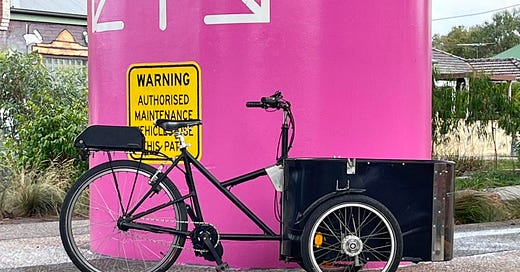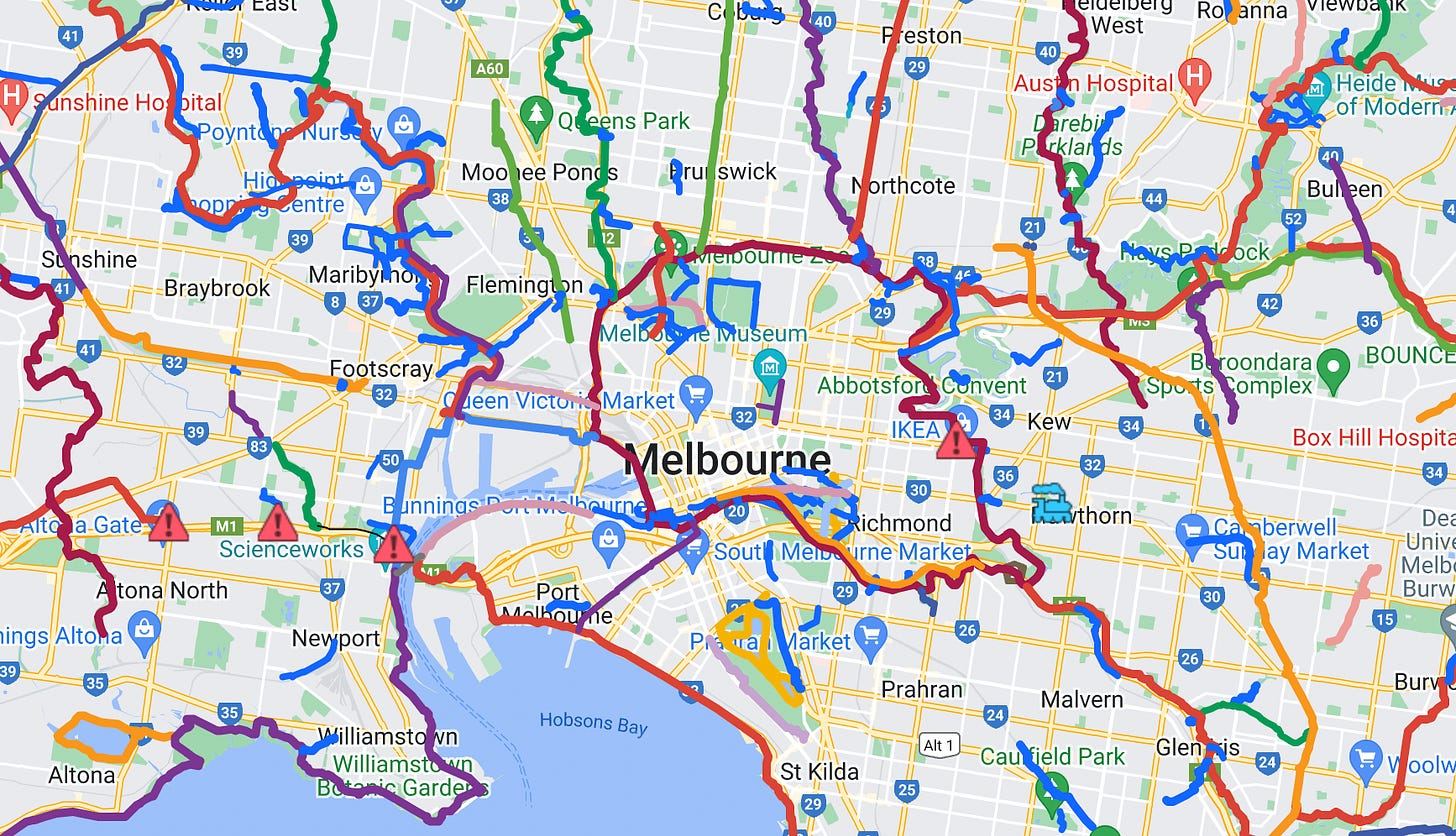One week with an e-bike has changed my life
Why aren't we rebuilding our roads and cities around these incredible machines?
I’m somewhat late to the e-bike game. I’ve had a non-electric cargo bike for a few years, but it always felt relatively slow and cumbersome, particularly in hilly terrain.
That all changed last week thanks to an aftermarket e-conversion kit. It’s been such an eye-opening experience that I’m instantly convinced we should rebuild our entire society and cities around electric cargo bikes, and electric bikes more generally.
My cargo bike is now the perfect machine. For starters, just look at it. It’s beautiful.
But let’s look at the practical aspects:
Speed: It’s almost perfectly optimized for rapid transport in real city conditions. It’s faster than a car for almost every typical city trip in real traffic. Imagine a car with a slightly lower top speed but with the ability to skip queues at lights and access a whole separate network of roads than regular cars can’t go.
Cargo: Can carry two small passengers (humans or dogs) or one larger. Or a ton of cargo. Or your commuting briefcase.
Safety: This thing is way more stable than a regular bike, and has more presence on the road. Even as a very experienced bike rider, I feel more confident on this thing on Melbourne’s car-dominated roads. And it’s much safer for everyone around me to be driving a bike (even if it’s larger than most) than a car, let alone a giant SUV or ute or truck.
Laziness: A cargo bike of this configuration is fundamentally a tricycle - preschoolers ride them. Lots of people jump in their car instead of on their bike because they’re feeling lazy - This eliminates that hesitation. There’s way less mental load in bad weather. You no longer have to slog uphill. You just pedal lightly and barely have to think - so easy.
Comfort: The worst part of commuting to work on a bike vs a car is having to shower and change at the end, or stink out the office with sweat. That problem is gone thanks to the motor. The commute is now a leisurely ride where you don’t need to work up a sweat. You can wear a suit and hop right into a serious meeting at the other end feeling fresh. Bonus: You don’t need to even put your foot on the ground while stopped at the lights.
Unfortunately, in backward countries like Australia, you’re still subject to the idiocy of compulsory bicycle helmet laws. But if you live in a country without this sort of authoritarianism, you can let your hair breathe free.
Wet weather: The front cargo has a rain cover to keep everything dry. And the ample cargo space means it’s easy to carry wet weather gear or a change of clothes up front.
Health: Even though some purists might frown upon ebike riders as soft, cheating etc, you still get the health benefits of a nice easy workout. And you can always switch off the pedal assist if you want to. Also, you’re exposed to less air pollution on a bike than in a car.
Economics: This setup is a fraction of the upfront cost of a car, and a fraction of the running costs too.
Cupholders: I haven’t done this yet myself, but the whole ride is so stable you could easily add a cupholder for a coffee or Big Gulp.
“EVs” shouldn’t mean cars. Electric cars are a social and environmental disaster compared to electric bikes.
This all stacks up to one clear conclusion - electric bikes should be replacing cars for most regular commutes and city journeys. Based on my anecdotal journeys through central city/middle belt Melbourne traffic (large city of 5 million people), it’s overwhelmingly faster unless you’re travelling a particularly long way across the city or if it’s a rare day when there’s no congestion and a high speed road exactly where you want to go.
Why then, are we promoting electric **cars** as a key destination for the energy transition? Instead, the goal must be to get people out of cars and onto bikes.
The interests of carbon emissions, resource usage, efficient transport, safer streets, a lower road toall, and broader public health all favour electric bikes, not cars.
Anybody who talks about electric vehicles and means “cars”, simply isn’t taking climate change seriously.
The missing infrastructure
To fix this, we need the right infrastructure.
By far the main factor that stops people biking is unsafe streets. Melbourne has some great bike paths in places, but they’re disconnected and sporadic.
A top transport priority should be to connect these up and provide a safe “bike highway” journey from any A-to-B journey.
Most streets are dangerous, congested, and often downright terrifying to ride a bike down.
This must change. Streets need to be redesigned to favour bikes, not cars. Fully separated bike lanes, traffic calming, and modal filtering. Streets can be converted to fully pedestrianized or accessible to local car traffic only by removing car thoroughfares.
The missing e-bike charging network
One big disadvantage of e-bikes is that you need to return to “home base” to charge, which can give you range anxiety for longer trips.
I’d love to be able to pull up by a local cafe and charge my e-bike just as easily are electric cars can charge their cars while out and about.
Again: It’s absurd that this isn’t a top priority for government and city planners looking to tackle climate change.
We need more cargo bike parking
Cargo bike parking, while still easier than car parking, isn’t as nice as it could be.
Regular car parks don’t work because there’s nothing to attach your bike to.
Regular bike stands don’t work because the spaces are often too narrow or short, being designed for regular bikes.
Parking them on the footpath can sometimes be tricky and sometimes feels rude because they take up a lot of footpath space.
At least a motor means it’s no longer a strain getting them up the ramps of typical office building basement car parking.
It would be great to see city codes and building codes prioritize bike parking over car parking, and convert a bunch of car parking spaces into cargo bike spaces.
Lockable storage
The biggest limitation I’ve found to using the cargo bike for a typical shopping run, is that you can’t make multiple stops because the front isn’t lockable. Lockable cargo seems like a no-brainer feature and something needed for cargo bikes to become a widespread “SUV replacement”.
Cars are killing us, and here’s the solution
The solution to decades of harm and suffering created by car-centric cities is right in front of us. It would be a shame to waste our once-in-a-lifetime energy transition efforts on switching from one harmful type of vehicles (petrol cars) to another harmful type of vehicle (electric cars).
Electric bikes, and electric cargo bikes can fix our cities and help fix climate change.





